Ditch the bed, study productively
Studying in bed can strain your neck, back and hips as the soft surface encourages the body to slump and sprawl.
When I was in high school, I came home from hours of musical, choir or show choir rehearsal and got comfortable in my bed to work on homework. Most of the time, that included turning on the television, having a blanket tucked under my chin, and my phone no less than five feet away. With all of the distractions, I struggled to be productive, and homework seemed like a massive chore that never seemed to get done. When I got to college, the desk in my small dorm room was left unused, and I spent the majority of my time on the first floor of the library, working on my homework before cracking open a book or watching a show.
For me, working on my homework in a separate place from where I was doing my everyday life made all the difference. Rather than having the distraction of television right nearby, or my bed up a ladder, all I had was a desk in front of me, and my phone playing music into my AirPods. It became a lot easier to complete my work, and I was even able to complete it in a timely manner. One of the biggest issues with working in your bed or in your bedroom rather than a separate place is the abundance of distractions– bed, television, blankets, games, pictures, etc. According to Healthline, “Working from bed decreases sleep quality, which decreases work productivity, energy levels, and quality of life.” This seemingly small decision to work in your bed can have polarizing effects on your everyday life.
This seemingly small decision can have polarizing effects on your everyday life
During the pandemic, I went right back to working on homework in my bedroom, and much like everyone at that time, I struggled to complete my work. My productivity went way down, I was unfocused, and even more so, I was just bummed. In a November 2020 study, “72% of 1,000 Americans surveyed said they had worked remotely from their bed during the pandemic – a 50% increase since the start of the crisis.” These people– likely didn’t have a nice desk and comfortable chair to utilize during the pandemic, or simply were more comfortable working in their bed. According to Susan Hallbeck, the Director of Health-Care System Engineering at the Mayo Clinic, “Your neck, back, hips and more are strained when you’re on a soft surface that encourages you to slump or sprawl– None of it is optimal, You’re really not supported in a way that’s conducive to work.”
Now there are many people who love working in their beds, and these people have grown in numbers with the pandemic and the rise of at-home work. According to Brain Wind, Clinical Psychologist, “If work has you feeling anxious, working from your bed can ease your mind, hence triggering creativity. It’s a great place to work on projects that feel daunting since you already associate it with relaxation.” Despite the positives, they say not to do this long-term. For college students, where stress, anxiety, and depression are all main feelings among students, working from bed seems like an obvious no. The bed may be an easy place to work, but its main use should always be for sleeping.















